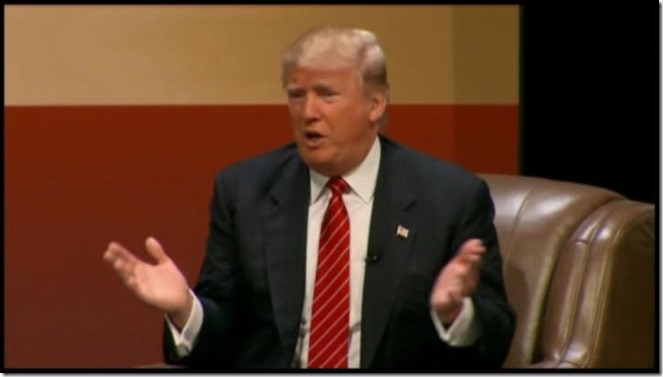Should More Executives Communicate Like Donald Trump?
Donald Trump’s blunt communications style has helped catapult him to the top of the Republican presidential polls.
Millions of Americans appreciate his unrehearsed and direct responses, which stand in marked contrast to the carefully poll-tested statements uttered by overly cautious candidates. In an age in which too many candidates have seemingly kept their true selves hidden from public view (consider this recent New York Times piece about Hillary Clinton), Trump can seem like a refreshing blast of fresh air.
Given Trump’s success, several people have asked me whether business leaders should endeavor to model his approach. The answer isn’t as clear-cut as one of Trump’s bluster-filled tirades.
First, I believe that many people are confusing the difference between “telling it like it is,” which can be an appealing trait in an executive, and acting like a jerk, which is not. Some of Trump’s nastier lines, which would fall into the latter category, would get a corporate leader sued for creating a hostile work environment. Just imagine what would happen if the head of Apple, Boeing, or United Healthcare uttered some of these actual Trumpian bon mots (as collected by Politico):
“I have black guys counting my money. … I hate it. The only guys I want counting my money are short guys that wear yarmulkes all day.”
Women: “You have to treat ’em like shit.”
“She’s not giving me 100 percent. She’s giving me 84 percent, and 16 percent is going towards taking care of children.”
“You know who’s one of the great beauties of the world, according to everybody? And I helped create her. Ivanka. My daughter, Ivanka. She’s 6 feet tall, she’s got the best body.”
“She does have a very nice figure. I’ve said if Ivanka weren’t my daughter, perhaps I’d be dating her.”
On Mexicans: “They’re bringing drugs. They’re bringing crime. They’re rapists. And some, I assume, are good people.”
On Carly Fiorina: “Look at that face! Would anyone vote for that? Can you imagine that, the face of our next president?”
Let’s tease those two things apart. Being a “jerk” is out for most corporate executives, but “telling it like it is” can work well—if doing so is both authentic and representative of the brand. That said, it strikes me that “telling it like it is” is often just a matter of tone. Consider these two (realistic but imagined) responses offered by a presidential candidate who supports a pathway to legal citizenship.
QUESTION: “So you’re saying you support amnesty for people who entered this country illegally?
POLITICIAN ONE: “Well, no, not exactly. I believe in a path to legal citizenship, but we’re going to have to evaluate who can stay and who shouldn’t.”
POLITICIAN TWO: “That’s exactly the type of question people are tired of. Let’s stop using words like ‘amnesty’ and talk about the real situation. We’re not going to expand government by hundreds of thousands of federal agents in order to round up and ship 11 million people out of the country. So let’s get serious here and talk about real solutions.”
Politician two might get more points for “telling it like it is” with the more confrontational reply, but really, the two answers are substantively identical. Can a corporate leader get more traction out of the second approach? Yes, sometimes. Such a projection of strength can be appealing, especially if it’s spoken by someone who truly believes the message.
Finally, it’s important to remember that while Donald Trump represents the “Trump” brand, most corporate CEOs represent a much broader constituency that includes employees, a board of directors, customers, and suppliers. Whereas Trump can benefit from being a lightning rod, most corporations prefer to avoid the type of divisiveness that creates unfavorable headlines and narrows their base.
What can corporate leaders learn from Trump?
First, they should learn that trying to speak in a style that isn’t authentic to them can backfire. Love him or hate him, few people think Trump’s tone is phony. He has been full of bombast for decades—and the GOP opponents who are trying to play Trump’s game are getting left in the dust (I’m looking at you, Scott Walker).
Second, they should remember to be as direct as possible in their communications. That’s one of the reasons we teach trainees to almost always answer the question they’re asked directly. People can spot someone who is trying too hard to fudge, obfuscate, or dodge—and they hold those evasions against that person. (I wrote more about that topic here.)
Third, they should know that unambiguous language can be appealing. You can usually say the same thing in many different ways—and oftentimes, the stronger and more absolute version does more to move minds than its more nuanced counterpart. (I wrote more about that topic here.)
Fourth, they should remember that unlike Trump’s recent declaration that “We don’t have time for tone,” tone does matter—a lot. Corporate leaders who emulate Trump’s un-politically correct style on issues related to race, gender, and ethnicity will likely find themselves managing an internal revolt, negative press, and a no-confidence vote from their board.
What do you think? Please leave your thoughts in the comments section below.




I agree totally with all of the above statements and analogies.
I believe, if Trump does stay in as a candidate and doesn’t get elected, and the next elected President fails to perform the way the American people want from a President, we will have egg on our face for not electing him. If he doesn’t get elected, it is because of his arrogance, meanness, badgering and insulting mannerisms.
If he does get elected, with all his faults known to be unpolitically correct, his business sense speaks for himself, and we may get ourselves on our way out of debt as a nation.
I see it as the pendulum has swung way too long in the one direction that has only dug our nation into a pit that will take decades to get out if we don’t tighten our belts now, so what’s 4 years or more to switch so far in the other direction of unpolitical correctness so long as we are climbing out of debt because one President has the guts “to tell it the way it is”, arrogant or not.